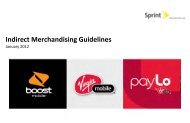

IDEN Phones have access to mobile data, at speeds similar to GPRS, or 2G. On May 4, 2009, during the Sprint Nextel Corporation Earnings Conference Call for the first quarter of 2009, Sprint CEO Dan Hesse said that "as of today, the messaging network on the iDEN network and for our Boost customers is back to normal." A Boost Mobile spokesman said that they did not anticipate the level of popularity for the new service, and that efforts to improve the network have been implemented to help mitigate the problem. The new service runs on the Sprint Nextel iDEN network, which previously was best known for its walkie-talkie feature. The quick spike caused by the unlimited service resulted in delays of up to several days for the text messages of many customers in April. Despite this lift, Nextel overall suffered a gross subscriber loss of 1.25 million contract subscriptions. The new unlimited plan resulted in a net gain of more than 674,000 customers in about three months. The plan was accompanied by re-focusing the brand towards a broader demographic than before. To compete with unlimited offerings from competitors in the wireless industry, Boost Mobile announced on Januthat it would launch its Monthly Unlimited Plan. In March 2012 Boost notified its customers that it will be phasing out the iDEN network and pushing forward with a CDMA network.


The result was significant growth, but Sprint-Nextel made the decision to pull back on the CDMA plans for unknown reasons. The service offered unlimited talk, text, and wireless web - but was only offered in a limited amount of states/markets. At the end of 2006, Boost launched its Unlimited by Boost Mobile Service on the CDMA network. With Sprint Corporation's purchase of Nextel in 2006, Boost Mobile remained as a wholly owned subsidiary of newly formed Sprint Nextel Corporation. Prior to their purchase of Boost Mobile, Nextel primarily focused on the business market. Until late 2004, Boost Mobile was only available in selected markets, primarily in California and Nevada. In 2003, Nextel purchased the American division of Boost Mobile. Unlimited voice plans on national carriers such as AT&T existed as early as 2001, but many people were unaware of this AT&T eventually dropped their unlimited minutes calling plans. Boost Walkie Talkie only reached other Nextel/Boost IDEN subscribers, and as a form of push-to-talk (PTT), was half duplex. A lure of Boost Mobile with the urban minority customer groups was that Boost's Walkie Talkie (Nextel's Direct Connect), for $1 a day ($30 per month), was the only way in the early 2000s (decade) to have something similar to unlimited voice minutes, and the advertisements effectively used "jive" or "slang" vocabulary. Peter Adderton and Craig Cooper brought it to the United States in 2001, and entered into a joint venture with Nextel Communications to launch and market the brand - primarily to be marketed specifically to the urban community. Boost mobile info.If you pay your Historyīoost Mobile was founded in Australia and New Zealand in 2000 by Peter Adderton.


 0 kommentar(er)
0 kommentar(er)
